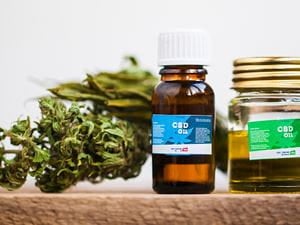
Cannabidiol, better known as CBD, is a naturally occurring compound found in the resinous flower of cannabis, a plant with a rich history as a medicine going back thousands of years. Today the therapeutic properties of CBD are being tested and confirmed by scientists and doctors around the world.
It's popularity has grown exponentially over the last few years. You can't walk into a mall without seeing it marketed to a wide audience. It has become so popular, that even big corporations are starting to add it to their products. Last year, Carls Jr. created a CBD infused burger that was a huge success in Denver.
But what exactly is this compound, and is it anything more than a modern day snake oil? Here is everything you need to know about CBD.
What is CBD and how is it related to marijuana?
Cannabidiol is a popular natural remedy used for many common ailments. It is one of the 104 chemical compounds known as cannabinoids found in the cannabis or marijuana plant, Cannabis sativa. Tetrahydrocannabinol (THC) is the main psychoactive cannabinoid found in cannabis, and causes the sensation of getting “high” that’s often associated with marijuana. CBD has the same chemical formula as THC, with the atoms in a different arrangement.
Both of these substances interact with the cannabinoid receptors found in the human body and brain, but they differed dramatically in their effects. Unlike THC, CBD is not psychoactive. This quality makes CBD an appealing option for those who are looking for relief from pain and other symptoms without the mind-altering effects of marijuana or certain pharmaceutical drugs. Furthermore, CBD, based on its chemistry, is not an addictive substance. Cannabidiol is not physically addictive and does not produce any physical withdrawal symptoms when you stop using it.
You can get CBD oil from hemp and marijuana. Hemp naturally contains a higher CBD to THC ratio than cannabis, with almost negligible amounts of THC. It is legal in all 50 states. CBD oil from Marijuana is slightly different. It has a higher risk of THC content, and is not legal in all 50 states. CBD oil is made by extracting CBD from the cannabis plant, then diluting it with a carrier oil like coconut or hemp seed oil.
What are the health benefits of CBD?
There is a wide range of possible ailments that CBD can help with. These include pain (neuropathic, chronic, cancer-related, etc.), epilepsy, multiple sclerosis, amyotrophic lateral sclerosis, Parkinson’s disease, inflammation, acne, dyskinesia, psoriasis, depression, bacterial infections, diabetes, rheumatoid arthritis, nausea, anxiety, ADHD, schizophrenia, substance abuse, heart disease, and irritable bowel syndrome.
Before you begin using CBD, it is a good idea to talk to your physician or a cannabis doctor for advice on dosing and potential drug interactions. Once you have decided that CBD is a good and safe fit for you, it is imperative to follow instructions and avoid taking more than the recommended serving size. Raising or lowering your dosage may produce the opposite of the desired effect. Also, taking your medication at the wrong times may lead to unintended increases or decreases in blood concentrations of CBD.
It’s important to note that some people also experience some adverse side effects from using CBD oil. For example, diarrhea, changes in appetite, and fatigue have been reported. Another problem with CBD currently, is that it is being produced without any regulation. This results in products that vary widely in quality. Overall though, CBD is generally considered to be a very safe alternative to many medications.
Are the health benefits of CBD backed up by science?
While many think that CBD is a modern day snake oil, there are actually a lot of studies currently being conducted to prove its health effects. These studies are coming out of reputable universities and agencies. They are growing each day and we hope to have more scientific evidence in the upcoming years.
CBD oil has shown promise as a treatment for both depression and anxiety, leading many who live with these disorders to become interested in this natural approach. In one study, 24 people with social anxiety disorder received either 600 mg of CBD or a placebo before a public speaking test. The group that received the CBD had significantly less anxiety, cognitive impairment and discomfort in their speech performance, compared to the placebo group. CBD has also shown antidepressant-like effects in several animal studies.
CBD may help reduce symptoms related to cancer and side effects related to cancer treatment, like nausea, vomiting and pain. One study looked at the effects of CBD and THC in 177 people with cancer-related pain who did not experience relief from pain medication. Those treated with an extract containing both compounds experienced a significant reduction in pain compared to those who received only THC extract.
For some, more human studies are needed. However ones given to animals are showing promise. Several animal studies have demonstrated that CBD may help reduce the inflammation and cell death associated with heart disease due to its powerful antioxidant and stress-reducing properties. For example, one study found that treatment with CBD reduced oxidative stress and prevented heart damage in diabetic mice with heart disease.
CBD oil has definitely become the hot new product in stores all across America. It's a great alternative to many medications, and with research and talking with your doctor you might be able to find a dose that works right for your body. Continue to track the studies that come out and see if your medical aliments are covered by its benefits.

